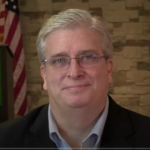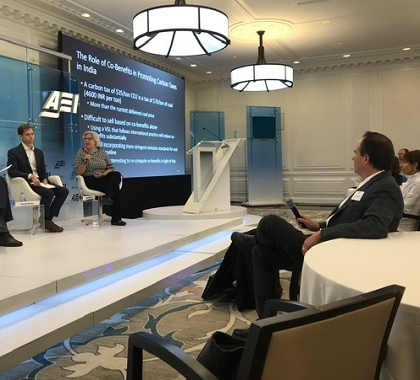The American Enterprise Institute (AEI) hosted a panel discussion today on the best ways to implement the Paris Climate Agreement, which President Donald Trump has rejected and considers a dead agreement. Heartland Institute Senior Fellow James Taylor was among many audience members who were skeptical about the ideas AEI was promoting.
The AEI event focused on whether “carbon pricing” (i.e., a tax on carbon dioxide) is the most desirable way to meet emissions reduction targets.
“‘Carbon pricing’ is a punitive tax in search of a justifying problem,” Taylor said before the AEI event. “Even without the burdens of the Paris climate agreement or a carbon dioxide tax, the United States is reducing carbon dioxide emissions faster than any other nation in the world. Yet despite dramatic U.S. emission declines this century, global emissions continue to rise. Punishing the American economy and American taxpayers in response to foreign emissions increases is pointless, ineffective, and callous.”
The Heartland Institute is a 34-year-old national nonprofit organization headquartered in Arlington Heights, Illinois. Its mission is to discover, develop, and promote free-market solutions to social and economic problems. It has hosted 12 International Conferences on Climate Change since 2009, and two America First Energy Conferences in 2017 and 2018.
Taylor is available for additional comments or an interview on your radio or TV program. Please contact Director of Communications Jim Lakely at [email protected] or text/call 312-731-9364.
Panelist Ian Parry of the International Monetary Fund pointed out how high a carbon dioxide tax would have to be for the United States to meet the reductions pledged by former President Barack Obama. According to Parry, taxes would have to be at least $70 per ton of carbon dioxide to meet Obama’s Paris pledge, and even higher for the United States and other nations to meet Paris’ stated temperature goals.
Yet Taylor points out that according to Resources for the Future, a $70 per ton carbon dioxide tax would raise U.S. gasoline prices 60 cents per gallon, hike home heating fuel costs 40 percent, raise natural gas prices 80 percent, and more than quadruple the price of coal power. AEI’s panelists nevertheless asserted the “social benefits” of imposing these costs on American consumers would more than justify the high costs. Parry claimed nations around the world see additional benefits to imposing a carbon dioxide tax because governments would collect “substantial amounts of revenue” from a tax.
Audience members at the conservative Washington think tank did not appear to buy the pitch for carbon dioxide taxes and substantially higher energy costs.
Adam Houser, national field director at the Committee for a Constructive Tomorrow (CFACT), pointed out that U.S. emissions have declined faster than any other nation in the world this century, adding the emissions decline has occurred without a tax on carbon dioxide. Hauser asked the panel to explain this, especially given the rapid increase in emissions from the rest of the world during this century.
In reply, panelist Joe Aldy – an associate professor of public policy at the John F. Kennedy school of Government at Harvard University and a former special assistant for energy and environment for President Obama – attributed the decline, in largest part, to the increased use of natural gas in the United States. He did not point out, however, that a tax on carbon dioxide tax would punish natural gas power.
Taylor, senior fellow for environment and energy policy at Heartland, asked this question at the event:
“AEI resident scholar Ben Zycher in a column last year documented the high costs and minimal temperature impact of the Paris agreement. He wrote, ‘Is there a plausible reason that the U.S. should remain a party to this charade? No, obviously.’ What has changed during the past year to nullify this AEI scholar’s observation?”
“I don’t think there was a consensus with that observation a year ago,” Aldy replied. “So I don’t know if I need evidence in the past year to challenge it.” Aldy added he takes “a very different approach,” and that the social cost of carbon dioxide emissions outweighed whatever economic costs would be imposed by a tax on CO2.
“The science clearly indicates humans are not causing a global warming crisis,” Taylor said after the event. “Even if that were the case, however, punishing Americans for foreign emissions increases is terrible and counterproductive policy.”
After the discussion closed, Myron Ebell, director of the Center for Energy and Environment at the Competitive Enterprise Institute, disputed Aldy’s dismissal of Zycher’s perspective. Ebell pointed out that Zycher’s criticism of the Paris agreement certainly was and is the consensus position among conservative public policy organizations like AEI.
Watch the entire presentation on AEI’s YouTube page at this link.





